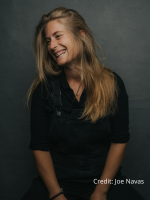Two years ago, Kurt Achin got really into paw-paws.
"There's a magnificent fruit that defies description, that crosses various barriers of what you have tasted before. It's part mango, it's part banana. It's got this very soft, yet bright, citrusy, tropical kind of consistency to it. And it's just amazing."
Kurt had actually never tasted a paw-paw until this fall, even though he learned about them a few years ago and got so excited about their potential for our area that he convinced members of the local non-profit Farming Falmouth to plant a whole pawpaw orchard in 2021. Paw-paws are North America’s biggest edible native fruit tree, and they were once abundant from here all the way west to Missouri. So this fall, Kurt traveled to the heart of the fruit’s range in the Midwest to attend the 25th annual Ohio Pawpaw Festival.
"I mean, Athens, Ohio is not a typical travel destination. But you know, for years now, I've been kind of seeing this Ohio Pawpaw Festival flash across my calendar and my social media feeds. And this is the year that I decided to just kind of pull the trigger and buy a plane ticket and go down there."
He was not disappointed. At the festival, Kurt was introduced to all kinds of paw-paw foods.
"There was paw-paw salsa down there that was paw-paw beer, syrups. They’re easy to sort of grind into a pulp that you can use to make confections, to stir into ice cream, to make smoothies."

He tasted it all. And then, he wandered around checking out the rest of the festival.
"Lots of exhibitors with sort of ecological things, solar and whatnot. There's a beer garden, there's a concert stage, and then there's just tons and tons of paw-paw related exhibits, NGOs that were trying to kind of spread the gospel of paw-paws."
I asked Kurt, "What is the Gospel of Paw-paws, if you had to summarize it?"
"Paw-paws are a native fruit and they are part of American history. They were a main food for the Indigenous inhabitants of the United States. They were a crucial food for escaped enslaved persons who made their way north. That was a source of nutrition for them to continue their journey," he explained.
"And they're just a very hardy fruit, which crucially is not transportable and not easily insertable into supply chains that last six and eight weeks. You can't ship them across country and expect them not to be sort of a box of black mush by the time they get there. So you have to have a local source, more or less of paw-paws. And down there in Athens, literally across from where I was buying paw-paws for a ridiculous amount of money per pound
to bring back. The guys were saying, listen, if you're willing to go out in the forest and hike and, you know, sort of forage a bit, you can pick all the paw-paws you want."
Five hundred years ago, the same would have been true here in many parts of present-day Massachusetts thanks to Indigenous pawpaw cultivators. But when European settler-colonists arrived they cleared huge areas of forest, and in many areas, paw-paws still haven’t rebounded.

"There are little pockets, I'm told, in western Massachusetts, especially where there's continuity of paw-paws. But they were native up and down the eastern seaboard as far north, even as Canada I'm told, they can grow a little bit up there. Somebody described it at the Ohio Pawpaw Festival as the tropical fruit that forgot to migrate south."
As you can hear, bringing it back to its native range and maybe eventually having our own paw-paw festival here is something Kurt is very excited about.
"I would love to see Falmouth become a mini paw-paw destination. And then maybe in the fullness of time, a major paw-paw destination, because there's no better fruit to sort of symbolize and embody the goals of a local food system than paw-paws. They are seasonal, they're native. Once you get them going, they're absolutely hardy and they'll just continue feeding a community."
Irresistible, right?!








